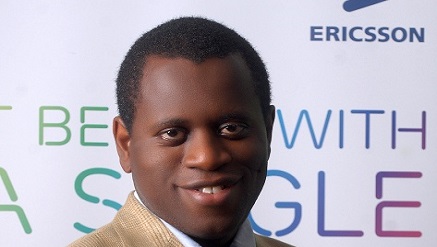News
Ericsson Ranks Lagos 38 in 2014 Networked Society City Index

Ericsson on Monday, published its latest Networked Society City Index, with Lagos (Nigeria) ranked as number 38 in a list of 40.
The index ranks 40 cities and measures their ICT maturity in terms of leverage from ICT investments in economic, social and environmental development: the “triple bottom line” effect.
According to Ericsson, Lagos ranks first in ICT maturity improvement 2013-2014 index and 38 in networked society city index rank 2014.
For instance, researchers at Ericsson found that, Lagos and Johannesburg provide very good examples of cities where the populations, in the absence of well-developed fixed infrastructure, use new mobile technologies to enable a connected life, including the use of social networks and mobile payments.
These cities have the opportunity to pass others by, for example, choosing not to set up formal banking systems and other expensive physical infrastructures and instead using advanced mobile technologies.
In contrast to Lagos and Johannesburg, the index also identifies cities that experience low ICT usage compared to their infrastructure and affordability.
The relatively low performance in ICT usage of Beijing, Istanbul, Shanghai, Tokyo and Miami is largely due to their less developed e-governance compared to other index cities.
By developing better e-services, these cities could improve many aspects of daily life for their residents. Developing their open data resources could also spur innovation.
Taipei is a well-developed digital city, but its ICT usage has not caught up to its rapid high-speed broadband development.
Taipei, like many other cities, suffers a digital divide among its residents. Digital divides – between and within cities – also reflect broader socioeconomic and urban development challenges.
This problem is even more pronounced in cities like Lagos and Johannesburg (see figure 8), where there remains much to be done to improve inclusion, such as addressing the low ratio of women to men who are connected.
Thus, one of the key findings from the report is the fact that cities with a low ICT maturity tend to be improving their ICT maturity faster than high performing cities, indicating a catch-up effect.
Many cities also have the opportunity to leapfrog others by avoiding expensive and increasingly obsolete physical infrastructure and instead moving straight into innovative applications using advanced mobile technology.
Monika Byléhn, networked society evangelist and driver of City Life at Ericsson, explained the importance of ICT in the development of cities: “Today, we are seeing so many new opportunities which are more or less provided by ICT. The way that cities are lead is increasingly built on ICT to provide efficiency and innovation, in basically all areas of a city, from health care to transport to utilities.”
Patrik Regårdh, head of Ericsson’s Networked Society Lab, adds: “Cities will be the major arena in which ICT can bring solutions for economic, social, and sustainable growth. As a leader in ICT development, solutions and implementation, Ericsson is playing a major role in realizing the Networked Society and paving the way for more efficient, effective cities. Besides our reports like the City Index, we are engaging in public-private partnerships to drive progress such as the New Cities Foundation, and collaborate with agencies such as the UN-Habitat-the agency mandated by the United Nations to promote socially and environmentally sustainable towns and cities.”
The top five cities (Stockholm, London, Paris, Singapore and Copenhagen) remain the same, though Paris has now surpassed Singapore to take the number three slot.
The nine new cities have been added in this year’s report are Berlin, Munich, Barcelona, Athens, Rome, Warsaw, Muscat, Abu Dhabi and Dubai.
Among these, Munich enjoys the highest ranking, followed by Berlin and Barcelona.
Also new in this year’s report is the inclusion of three predictions about the urban future derived from new technology and ICT solutions and applications: Smart citizens: People rather than institutions will drive urban progress to a larger extent, with more open public services and governance approaches characterizing this power shift.
Also, GDP redefined: By moving toward a more collaborative and sharing economy, ICT solutions will provide opportunities to create more value from fewer resources, therefore necessitating an adjustment of GDP to mirror the values important for a sustainable society.
And power of collaboration: Tomorrow’s networking organizations will be more flexible and efficient thanks to collaboration.
Therefore the prevailing conditions of city management will also evolve, requiring changes in legislation and governance.
The Ericsson Networked Society City Index has been developed in close collaboration with Sweco, the sustainable engineering and design group.
News
AfDB Supports Francophone Africa Start-ups with €6.5M

The African Development Bank Group last week approved an investment of €6.5 million in the Saviu II fund in order to support technology start-ups through their seed phase and first institutional fundraising, mainly in French-speaking Central and West Africa.

The Bank will invest €4.5 million as equity and €2 million as a first-loss hedging tranche on behalf of the European Commission, under the Boost Africa Programme.
This participation of the Bank Group will enable the Saviu II fund to give priority to companies with a strong technological or digital component.
Saviu II, the second investment vehicle of Saviu Partners, plans to invest between €500,000 and €3 million in about 20 technology or technology-oriented business-to-business start-ups in the seed phase or carrying out first institutional fundraising.
The Saviu II venture capital fund aims to make at least 60% of its commitments in the French-speaking countries of West and Central Africa: Côte d ‘Ivoire, Cameroon, Benin, Senegal, Togo, Burkina Faso and Mali.
The fund can also co-invest in promising technology companies in East Africa that have a strong team and business model, and whose strategy includes entering the market in French-speaking West African countries and establishing a strong presence there.
In addition, the fund will devote a dedicated envelope to pre-seed investments, focusing on minority equity investments, usually in co-investment with studios, incubators or other ecosystem partners.
News
Nigeria Inks $1.3bn MoU with AFC for Alumina Refinery, Mining Push

Nigerian Government has signed a $1.3 billion Memorandum of Understanding (MoU) with Africa Finance Corporation (AFC) via the Solid Minerals Development Fund (SMDF) to fund an alumina refinery, national geoscience mapping, and a strategic investment vehicle for mining growth.

Special Assistant to the Minister of Solid Minerals Development, Segun Tomori, said the refinery will process one million tonnes of bauxite yearly using a modern Bayer process, powered by an on-site gas-fired cogeneration plant.
Minister Dele Alake called it a transformative milestone boosting GDP, aligning with reforms that improve investment climate, regulations, and licensing to attract private capital. He directed agencies to fast-track permits.
The 20-year project at 95% utilization eyes 19 million tonnes total output, $1.2 billion annual GDP addition, $25 billion economic impact, and $8 billion forex earnings, per feasibility studies.
SMDF Executive Secretary Fatima Shinkafi termed it the agency’s biggest funding deal, supporting value-addition policy.
The partnership extends to geoscience mapping for mineral data, de-risking exploration, and a joint vehicle for mining assets.
Permanent Secretary Engr. Farouk Yabo praised the reforms. Shinkafi signed for government; AFC’s Franklin Edochie for the corporation, witnessed by AFC CEO Samaila Zubairu.
Tomori positioned it as Nigeria’s largest private mining investment and FDI magnet.
News
TeamApt, Awabah Partner to Boost Pension Drive for Nigerians

TeamApt Ltd., a subsidiary of Moniepoint Inc. and a leading financial infrastructure provider, has partnered with Awabah, the National Pension Commission’s first licensed Accredited Pension Agent, to expand pension access for millions of Nigerians in the informal economy.

The partnership was unveiled in Abuja at the launch of Awabah’s agent licence, themed “Building Financial Resilience: Securing the Future with Personal Pensions.”
At the event, PenCom Director-General Omolola Oloworaran underscored a major imbalance in Nigeria’s pension system, noting that while pension assets have grown to over ₦27 trillion, the benefits remain largely concentrated among formal-sector workers. She observed that most informal-sector workers—who make up the majority of Nigeria’s workforce—still retire without any form of savings.
This challenge is further highlighted in Moniepoint’s 2025 Informal Economy Report, which reveals that although 65 per cent of informal businesses recorded revenue growth, most lack the structural resilience required for long-term sustainability and succession.
Through the partnership, TeamApt—a Central Bank of Nigeria–licensed switching and processing company—will enable seamless pension registration and contributions for Awabah users via its Direct Debit service on Point of Sale (POS) terminals nationwide. Informal workers can enrol for personal pensions, tokenize their cards, and automate periodic contributions in just a few steps.
The initiative simplifies pension savings by turning what was once a complex, bureaucratic process into a routine transaction, enabling business owners and workers to build financial security beyond their productive years.
“When we started Awabah, we were driven by one core belief—that no African worker should be one accident or crisis away from poverty,” said Tunji Andrews, Chief Executive Officer of Awabah.
“This partnership with TeamApt allows us to scale that vision. By leveraging their Direct Debit service and extensive POS network, we are meeting informal workers where they already operate—markets, workshops, kiosks, and roadside businesses. With small, regular contributions, workers can now access personal pensions bundled with health, accident, and life insurance,” he added.
TeamApt CEO Dennis Ajalie said the collaboration aligns with the company’s long-standing mission to power Nigeria’s informal economy.
“At TeamApt and Moniepoint Inc., our focus has always been on enabling the informal sector,” Ajalie said. “Today, working within our licence framework and alongside our co-subsidiary, Moniepoint Microfinance Bank, we operate across all 774 local government areas, serving millions of Nigerians who drive economic activity.”
He described the partnership as a critical step toward pension inclusion, adding that it demonstrates how financial infrastructure can deliver real, long-term value to everyday Nigerians.
Ajalie also praised PenCom’s leadership for creating an enabling environment for innovation, noting that Oloworaran’s reforms have opened the door for partnerships capable of delivering sustainable pension coverage for informal workers.
The initiative is powered by TeamApt’s robust financial technology ecosystem, which has supported banks, fintechs, and financial institutions for more than a decade. Its omni-channel Direct Debit service allows automated recurring collections—such as pension contributions, subscriptions, and repayments—directly from customers’ bank accounts with their consent.
Beyond pensions, the platform enables informal workers to automate investments in the capital market, access healthcare through HMOs, and secure insurance coverage for themselves and their families—extending financial security far beyond retirement.

 E-Financial2 days ago
E-Financial2 days agoIran-Israel-US Conflict and CBN’s FX Gains: A Stress Test for Nigeria’s Monetary Stability

 E-Financial2 days ago
E-Financial2 days agoMutual Benefits Assurance Reaffirms Full Regulatory Compliance, Enhanced Governance

 General News2 days ago
General News2 days agoJAMB Uncovers AI-Driven Fraud Targeting UTME Candidates, Warns Parents

 General News2 days ago
General News2 days agoSERAP Asks FCCPC to Investigate Google, Meta, Others over Alleged Rights Abuses

 News2 days ago
News2 days agoTeamApt, Awabah Partner to Boost Pension Drive for Nigerians

 News2 days ago
News2 days agoFlashChange CEO, Bidemi Oke, Urges Startups to Build Strong Governance Structures Early

 E-Financial2 days ago
E-Financial2 days agoReps Mull Commission to Regulate Fintech Operations

 General News2 days ago
General News2 days agoCapelli Institute Commits to Advancing Trichology in Nigeria



























